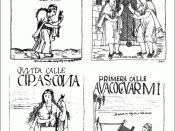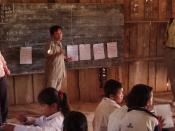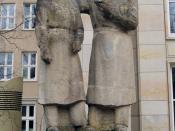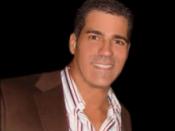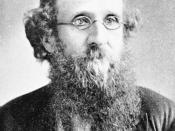Rodriguez's experience with education appears to be a extreme form of transculturation. Rodriguez is of Mexican decent and his parents have both been here for many years. His mother and father both wanted him to have a prominent secular position once he graduated from school.Rodriguez was a quick study so he quickly fell into the mold his parents had made for him. It appears that Rodriguez may have been successful at obtaining his goals. But at what price did he pay for his success? Rodriguez himself may now believe he has paid the ultimate price for his success.
Rodriguez takes the process of transculturation to a extreme in many ways. Transculturation can be described as the change in a culture brought about by the diffusion within in it of elements from all cultures. Rodriguez loses touch with his personal life and the customs and beliefs that are a intricate part of his culture.
Rodriguez tells us about how proud he was when one of his grade school teachers told him he was losing all traces of his Spanish accent(622). This was just the beginning of a behavior that would cause him to lose contact with his roots. Rodriguez seems to be have been made to feel that true knowledge could only be obtained through a unyielding acceptance of western civilization and ideas. Pratt would probably have disagreed with Rodriguez's perception of learning. Pratt said that "Autoethnography, transculturation, critique, collaboration, bilingualism, meditation, parody, denunciation, imaginary dialogue, vernacular expression, incomprehension, dead letters, unread masterpieces, absolute heterogeneity of meaning these are some of the perils of writing in the contact zone(590). From this quotation we learn that she believes that bilingualism is one of the arts of the contact zone. Rodriguez's accent is a small variation and a symbol of bilingual ability. Rodiguez obviously is pleased when his attempts to conceal his accent appear to be working. He therfore fails to practice one of the arts of the contact zone that would come naturally to a person of foreign decent. Pratt believes that the arts of the contact zone encourage broader aspect of learning. Rodriguez's attempts to conceal his accent probably would not have received much praise from Pratt.
Rodriguez tells us that he sometimes corrected his parents when they misspelled words. This was an example of the first social barriers he began to put up that separated him from his parents. Although mispronounced words are not part of his parents culture, they gave him an excuse to disregard other things that were. Pratt came to a understanding of this when she tells us about her son in school. She tells us that her son would receive a star fro completing his assignments. The teacher never took time to consider what the child was trying to say. In a similar manner Rodriguez disregarded the subtle messages his parents tried to relay to him because they came in a package that his formal education had taught him was unacceptable. Rodriguez recalls looking upon his parents in contempt when they felled to measure up to his ever increasing standards(627).
Rodriguez tells us from the reading that he learned spontaneity and nonrational ways of understanding but at school he learned a less chaotic and orderly way of learning(623). It appears that the author is trying to imply that his days at home contrasted with his secular learning. From further readings one can confer that the author uses this as an excuse to isolate himself from the chaos that ruled his evenings. This perception of learning and the educational system flies in the face of what Pratt and other educators of similar thinking have tried to create. Pratt said "We are looking for the pedagogical arts of the contact zone. These will include , we are sure exercises in storytelling and attitudes of others; experiment in transculturation and collaborative work and in the arts of critique, parody, and comparison(including unseemly comparisons between elite and vernacular cultural forms"(595). Here Pratt believes that storytelling and other less formal ways of understanding should be submerged into the learning process. To Pratt there is no giant rift that should divide our secular studies with our social understanding. A process such as storytelling uses spontaneity and sometimes irrational ways of thinking to bring people to a better understanding. Rodriguez obviously believed that these were two modes of thinking that must be kept separate.
Throughout much of the reading the reader cannot help but to pickup a almost robotic way of thinking by the author. I was like he was losing touch with what made him human. He no longer had time to consider the sadness his mom obviously felt when he chose to isolate himself in his studies. Rodriguez was only concerned about the praise he would receive from his teachers at school. The contempt he had for his parents lack of understanding became evident when he said "I heard my father speak to my teacher and felt ashamed of his labored, accented words"(627). This situation gives us a rare glimpse of a contact zone between Rodriguez's father and his teacher. Because of the author's arrogant and self centered ideology little is learned about the arts of this contact zone. Obviously arts such as transculturation and collaboration were in abundant supply. Rodriguez failed to realize that the secular world he lived was made possible only b his parents laborious efforts. It appears that Rodriguez regarded western civilization as being a dominant culture. Pratt probably would expect to seem some sort of autoethnographic material emerging. Pratt said that such texts were "a marginalized groups point of entry into the dominant circuits of print culture"(586). Pratt here is trying to show the difference in one person telling another's story and a person telling their own from their own from their point of view. Instead of resurfacing some of the cultural differences of his inherited culture he immediately equates his parents way of life and the things he is accustomed to, to be tied up with ignorance.
Throughout much of the reading Pratt refers to himself as a bad student. This appears puzzling to the reader when taking into account his apparent dedicated study habits. Rodriguez tells us that he was a mere learner of facts(626). Rodriguez can be quoted as saying that "I was the last one who dared to have a opinion of my own"(632). The author did not feel compelled to think critically but only rely on the knowledge coming from his teachers. This seems to represent the pattern of teaching described by Friere. Rodriguez complete acceptance of western ideas did not leave any room for critical thinking. Such thinking may have discouraged the author from embarking on his reclusive way of life.
Rodriguez tells us that what made him successful was the fact that he was aware of the way school was changing him(623). Only in his adulthood did he take time to reflect on how much he had changed since his childhood. The author seems to regret some of the things he misses during his childhood.
The authors extraordinary ability to place facts and figures does is cannot be equally compared with Poma's letter. Pratt states that "he does not imitate or reproduce it; he selects and adapts it along Andean lines to express Andean interests and aspirations"(589). It is apparent to the reader that the process that Poma undertook to write his letter was far more complicated than the authors educational process. Poma was able to take facts and the Spanish language and use it to communicate the ideas of his own culture. What the author has done seems to be to merely imitate the study habits of his educators. He does not use reasoning in selecting information, but he behaved more like a computer merely following instructions as efficiently as possible.
Rodriguez tells us that he began to idolize his grammar teachers. This was because they embodied that correctness that he felt was a part of western civilization. The author envied them because they seemed to have mastered all the things he was striving to be .
Rodriguez tell us that he intended to hurt his parents for encouraging him into learning english(625). It seems that Rodriguez believed that his parents were somewhat responsible to exposing to him to a from of education that would later consume him. The author admits at the end of the essay that he begins to yearn for his childhood before he became engulfed in his books. Rodriguez begins to question whether or not his formal education was worth the loss of his childhood. After coming back from England we learn that he moves back home with his parents to try to recover some of the intimate moments he lost during his childhood. While he is there he observes some similarities between him and his father.
Rodriguez is quoted as saying that "I watched them looking for those elastic, sturdy strands that bind generations in a web of inheritance." Pratt would probably believe that him coming home would create a new contact zone. This new contact zone is different from the first in the fact that the author seems ready to observe this one as and take not of the similarities he shares with his family. The author had created his own world much different from that of his family while living in their midst. Pratt would probably believe that a new contact zone now existed between him and his parents.
Rodriguez had believed that his isolation was crucial to him becoming a good student. In the process he not only absorbed western culture but he replaced his own culture with it. The author now believes this to be a mistake. His culture includes his own way of thinking and the values taught to him at home. I think that the author needed some balance in his early life. The lack of balance has led to a feeling that he has missed something. All and all I think the author has learned a important lesson, in that balance is needed in all aspects of life.
